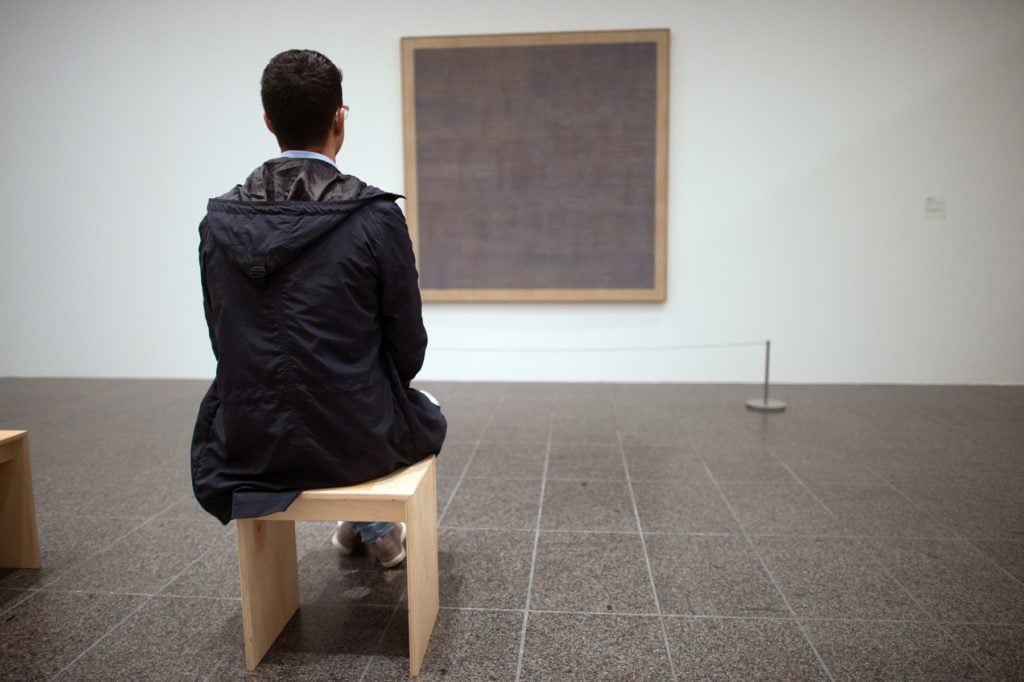Law & Politics
A Judge Has Thrown Out a Lawsuit Claiming Pace Gallery’s Owners Are Abusing Their Power Over the Agnes Martin Market
Judge Andrea Masley calls the claim "vague." Dealer James Mayor vows to fight on.

Judge Andrea Masley calls the claim "vague." Dealer James Mayor vows to fight on.

Art authenticators and catalogue raisonné authors can breath a sigh of relief. For a second time, a judge has shut down a set of extensive legal claims brought by a disgruntled dealer against specialists in abstract painter Agnes Martin.
The dealer, London-based James Mayor Gallery, has launched several efforts against high profile art dealers Arne Glimcher, the founder of Pace Gallery, his son, Marc Glimcher, who is president of Pace, as well as Tiffany Bell, the editor of the Agnes Martin catalogue raisonné at Artifex Press. In April 2018, Mayor sued in New York State Supreme Court, alleging that the defendants “unlawfully declared that thirteen authentic Agnes Martin artworks are fakes, resulting in a loss to The Mayor Gallery LTD of more than $7 million.”
Mayor had filed earlier, similar claims in 2016, but the judge dismissed these in April 2018.
Throughout the 16-page decision dismissing the claims, judge Andrea Masley repeatedly wrote that Mayor, “did not assert new facts” to support his claims, which included product disparagement, tortious interference, negligent misrepresentation, gross negligence, and breach of contract.
“They brought this lawsuit twice,” noted Aaron Richard Golub, attorney for the defendants. “The judge gave them every opportunity in the world to make every claim under the sun, which they did. They personally sued Marc and Arne and it was a baseless, mean-spirited lawsuit. In the main, it was all about the rights of catalogue raisonne committees.” Golub noted that similar claims were what prompted expert committees for artists including Andy Warhol, Jean-Michel Basquiat, and Keith Haring to stop authentication activity as they were “forced out of business,” he says.
Golub added: “The art world as it exists today needs to have works that are validated. Otherwise the collector is at the mercy of the vagaries of what can happen illegally.”

Left to right: Arne Glimcher, (Photo by Gary Gershoff/WireImage); Marc Glimcher (Photograph by Kris Graves. Courtesy Pace Gallery.)
But Mayor is not giving up and plans to appeal. His attorney, Mel Leventhal, told artnet News via email: “We of course respect Justice Masley’s decision. However, the decision is now ripe for review in the appeals court which will carefully examine Justice Masley’s reasoning and ultimately render the opinion controlling in this case. And it may be a year before that appellate court decision is rendered.”
Leventhal added: “It is also significant that TEFAF has recently adopted a new ‘global vetting policy’ under which ‘vetting Committees will be composed of academics, curators, conservators, conservation scientists and independent scholars only.’ Under the new policy ‘art dealers and auction house experts will no longer be voting members on TEFAF Vetting Committees.’ This new policy is, in substance, addressed to the Agnes Martin Catalogue Raisonné, which has both Arnold Glimcher and his son Marc Glimcher—both prominent art dealers in Agnes Martin works—as members of its review committee.”
According to judge Masley’s decision: “All claims in the [first amended complaint] against the individual defendants were previously dismissed by this court in resolving [the first motion]. In the [second amended complaint] plaintiff does not assert new facts as to any act or omission by [Tiffany] Bell in connection with any of the claims.”
Further, Masley said that whether or not inclusion of a work in a catalogue raisonné “has any bearing on a work’s value has been recognized by New York courts as a function of the art marketplace, and it is not for the court to determine what the art market should or should not credit as reliable.”
In the amended complaint filed after his first defeat, Mayor had alleged that Arne and Marc Glimcher were financially motivated to exclude the works in question from the catalogue raisonné. Judge Masley referred to the new claims as “vague” and called them “speculative in that they do not identify any specific financial benefit defendants, particularly the Glimchers, obtained in not including the thirteen artworks.”
In addition to dismissing the claims, judge Masley ordered the appointment of a “special referee” to consider the defendants’ motion for recovery of attorney’s fees and costs.